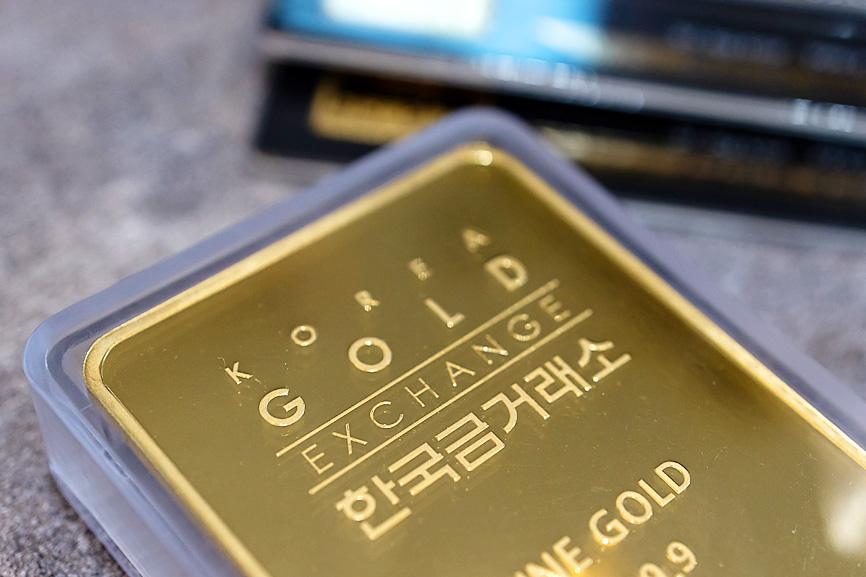Gold posted its biggest weekly gain since July 2020 as the war in Ukraine fueled demand for haven assets.
Investors are assessing the economic fallout from Russia’s invasion of its neighbor, which is disrupting flows of energy, grains and metals.
The resulting surge in oil prices has stoked concerns about global growth and inflation risks.

Photo: Bloomberg
Investors have sought out bullion amid the uncertainty, with holdings in exchange-traded funds backed by the metal climbing to the highest since March last year and hedge fund managers boosting their net bullish gold bets to a 19-month high.
Gold prices extended gains on Friday after a US payrolls report showed that wage growth slowed even as hiring boomed last month. The figures might offer some respite from strong inflationary pressures as the US Federal Reserve gets set to raise interest rates.
The metal “is in a sweet spot for the time being as traders certainly want to have exposure to gold given the war situation in Ukraine,” Ava Trade chief market analyst Naeem Aslam said. Still, the jobs data “has confirmed that the Fed has the green light to increase the interest rate and this is likely to keep the gold price on a tight leash.”
Spot gold on Friday rose 1.7 percent to US$1,972.06 an ounce in New York for an about 4.2 percent weekly gain, the biggest since July 2020.
Bullion for April delivery increased 1.6 percent to settle at US$1,966.60 on the Comex.
Spot palladium advanced 8 percent, topping US$3,000 for the first time since May last year on concerns over potential supply disruptions. The metal is up 27 percent this week. Russia produces about 40 percent of the metal mined globally.
Silver and platinum also surged.
Commodity prices soared the most on record this week as Russia’s invasion of Ukraine threatens key supplies of energy, crops and metals that were already tight as major economies emerged from the COVID-19 pandemic.
The Bloomberg Commodity Spot Index, which tracks 23 futures contracts, climbed 13 percent in the week that ended on Friday. That is the most in data going back to 1960.
Russia’s growing isolation has left traders rushing to secure alternatives to the country’s raw materials, sparking fears of prolonged shortages and accelerating global inflation.
The sanctions, coupled with shipping disruptions in the Black Sea, have brought trade deals with the country to a virtual standstill. Russia is a major supplier of crude, natural gas, grains, fertilizers and metals such as aluminum.
Russia and Ukraine also supply more than one-quarter of world wheat exports, one-fifth of corn sales and a similar share of barley shipments, plus about 80 percent of sunflower oil cargoes.
Europe depends on Russia for about one-quarter of its crude oil and one-third of its natural gas. Russian aluminum typically accounts for about 10 percent of US imports.

South Korea’s equity benchmark yesterday crossed a new milestone just a month after surpassing the once-unthinkable 5,000 mark as surging global memory demand powers the country’s biggest chipmakers. The KOSPI advanced as much as 2.6 percent to a record 6,123, with Samsung Electronics Co and SK Hynix Inc each gaining more than 2 percent. With the benchmark now up 45 percent this year, South Korea’s stock market capitalization has also moved past France’s, following last month’s overtaking of Germany’s. Long overlooked by foreign funds, despite being undervalued, South Korean stocks have now emerged as clear winners in the global market. The so-called “artificial intelligence

‘SEISMIC SHIFT’: The researcher forecast there would be about 1.1 billion mobile shipments this year, down from 1.26 billion the prior year and erasing years of gains The global smartphone market is expected to contract 12.9 percent this year due to the unprecedented memorychip shortage, marking “a crisis like no other,” researcher International Data Corp (IDC) said. The new forecast, a dramatic revision down from earlier estimates, gives the latest accounting of the ongoing memory crunch that is affecting every corner of the electronics industry. The demand for advanced memory to power artificial intelligence (AI) tasks has drained global supply until well into next year and jeopardizes the business model of many smartphone makers. IDC forecast about 1.1 billion mobile shipments this year, down from 1.26 billion the prior

People stand in a Pokemon store in Tokyo on Thursday. One of the world highest-grossing franchises is celebrated its 30th anniversary yesterday.

Chinese artificial intelligence (AI) start-up DeepSeek’s (深度求索) latest AI model, set to be released as soon as next week, was trained on Nvidia Corp’s most advanced AI chip, the Blackwell, a senior official of US President Donald Trump’s administration said on Monday, in what could represent a violation of US export controls. The US believes DeepSeek will remove the technical indicators that might reveal its use of American AI chips, the official said, adding that the Blackwells are likely clustered at its data center in Inner Mongolia, an autonomous region of China. The person declined to say how the US government received